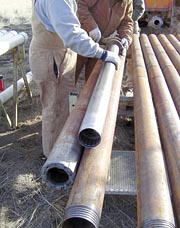
In 1966, I delivered a new Failing 1250 rig from the factory in Enid, Okla., to Georgia Institute of Technology in Atlanta. Upon arrival, I was asked by the professors to go over the inventory to see that everything they had ordered was there. Learning that these people knew very little about drilling or drilling rigs, I figured that operating this new rig for the college could be a great job. Before leaving the college the next day, I applied for the job. Shortly after returning to my home in Enid, I received a telephone call: I had the job. I immediately drove back to Georgia Tech in my 1958 Ford pickup. Bess and the boys would come along later.
I filled out papers and located a temporary apartment upon my arrival. Then commenced daily attendance at Georgia Tech as a staff member and senior research technician (read: driller). While my rig was being fitted for core drilling in South Georgia, I was making lists of supplies needed to do the drilling. I presented my list to Barbara Bell at the purchasing office. As she went over my handwritten list, Barbara would correct my misspelled words by drawing a circle around them with a red pen and write the correct spelling over each misspelled word (supplys = supplies). Laughing, I told Barbara I came there to work, not learn; however, I learned a lot.
Barbara questioned many items on my list “What's the following used for on a drilling rig?” and required an acceptable explanation for each, such as electrical conduit = making pipe racks; eave trough = core sample catchers; wagon wheels = wheels for core sample catchers; garden hose = siphon hose for transferring fuels; powdered graphite = for locks and to mix with gun grease. Every explanation was accepted to her questionable satisfaction.

Before taking the new rig to South Georgia, I asked my superiors if I could test it out at the Georgia Tech machine shop. We found that when using the pulldown, the drill pulled up instead of down! Further investigation with Failing found that after the rig was tested at the Failing factory, the pulldown chains were removed and installed on another drill. Then, when replacing the chains, they were crossed, causing it to pull up instead of down. Installing the chains properly solved the problem.
While in the Georgia Tech machine shop, I overheard a professor ask the shop foreman, “Do you paint trucks?” The foreman answered, “We never have!” The professor thanked the foreman and went on his way. Later, I asked the foreman, “Couldn't you have painted the truck for the professor?” His response: “Did he ask me if I could? Here at Georgia Tech, you don't volunteer that you can do anything!”
I was at Georgia Tech three times with the rig. Once, I was in Atlanta with the rig having the air brakes checked because only the front wheels were stopping the rig. After much testing and through process of elimination, we found that a short air line in the truck frame had been plugged with a paper grease pencil (apparently, this was done by a factory employee when the truck was built). Removing the pencil fixed the brakes.

As a Georgia Tech rule, we couldn't park the drill and support truck on private property. Many times, we were forced to leave the drill on site, in the borrow ditch beside the road or highway. Once, after a long three-day weekend, someone had broken the windshields on both trucks; another time, tools and pipe wrenches had been stolen from locked toolboxes.
When I was the drilling super-visor/teacher, I advised the drill crew not to raise the drill tires completely off the ground, as it just invited someone to steal the tires. They didn't do as instructed, and when we returned to the borrow ditch drill site one Monday morning, all 10 tires were missing from the rig and the spare tire was missing from the support vehicle.
I immediately reported it to the officials at Georgia Tech. They reported it to the campus police, who, in turn, reported it to the county sheriff, who, in turn, reported it to the Georgia State Highway Patrol, who, in turn, reported it to the Georgia Bureau of Investigation (GBI). Three days later, while we were standing by, the college made arrangements for us to meet the GBI in Perry, Ga., some three hours away from the theft. We met the GBI in Perry, and after some friendly discussion, found that we could have met in Adel, Ga., where we and the GBI people all lived. The tires were replaced approximately a week later, while my drill crew and I waited patiently on site every day. The stolen tires and the crooks never were found.
One thing I learned at Georgia Tech: Most college scientists didn't understand drilling! Sometimes while core drilling, we would only recover 80 percent of a core; however, on the next core run, we would pick up the 20 percent lost core, plus 100 percent of the current run, logging 120 percent recovery. The scientist, not understanding core drilling, thought that when you lost something, it was gone and you couldn't recover more than 100 percent. Therefore, scientists, untrained in drilling, made many feet of inaccurate drilling reports, findings and printed publications.
My driller assistant and myself were logging a drilled hole one day when the expensive probe broke off at the cable and was lost in the hole. We immediately reported it to the proper people at the college. They advised us to plug the hole, and they would place an emergency order for a new one.
I was sure that I could recover the probe with the proper fishing tool. Since it was Friday, the assistant and I went home. I built a fishing tool and before the officials returned to the drill site Monday afternoon with a new probe, we had the lost probe out of the hole, undamaged, and the hole plugged as instructed. Thinking they would be appreciative, I advised our field engineer of our success. He then reported the success to our college officials. A few days later, I received a certified letter from our professor/scientist/supervisor that I had made a liar out of him in that he had made a sworn statement that the probe was unrecoverable. In the future, I was to do as he instructed.
A short time later, I was laid off! ND


Report Abusive Comment